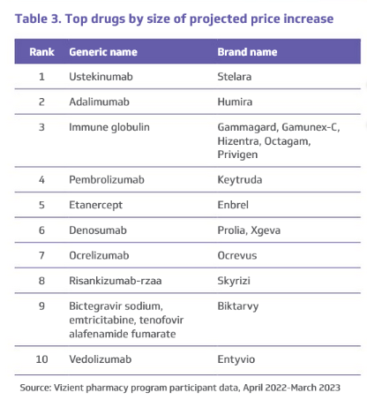Long Covid gene discovered, diabetes danger from PPIs, DEA moves on telehealth, and more
11 Aug 2023
Posted by Andrew Kantor
Mahlon Davidson named GPhA interim CEO
 While the search for a permanent association CEO continues, the GPhA Board of Directors offered the position of interim CEO to past president Mahlon Davidson, who graciously accepted.
While the search for a permanent association CEO continues, the GPhA Board of Directors offered the position of interim CEO to past president Mahlon Davidson, who graciously accepted.
Sayeth GPhA President Joe Ed Holt:
Mahlon has an extensive history with GPhA, serving with class and style on just about every committee and as association president from 2021 to 2022. There are not many people out there who love GPhA as much as Mahlon. He will do a great job!
PPIs and diabetes
Long-term use of proton pump inhibitors (PPIs) for acid reflux could raise your (or your patients’) risk of diabetes.
That’s the conclusion of Chinese researchers who looked at the medical records of more than 200,000 American and British patients and 10,000 cases of diabetes over an average of 9 to 12 years.
And the longer these drugs are taken, the greater the risk seems to be, the findings show, prompting the researchers to advise that people taking these drugs for 2 or more years should have regular blood glucose check-ups to screen for diabetes.
Add to that the fact that “Long-term use [of PPIs] has been linked to an increased risk of bone fractures, chronic kidney disease, gut infections and, stomach cancer,” and you might want to have a conversation with some of your patients.
DEA considers telehealth registry program

You might remember earlier this year when the DEA was planning to go back to pre-pandemic rules about C-II prescriptions. No more telehealth without an in-person visit, for example. It got a ton of pushback considering how much good the relaxed rules had done. In May the agency relented … but still held out the possibility of script tightening.
The latest twist: The DEA now says it’s open to creating a special registration process for telehealth providers that would not require an in-person exam. It’s holding an open listening session on September 12 and 13 to hear what folks have to say.
AIP is on the move
Next on AIP’s “DIR Hangover Preparation Tour” was Taylorsville Pharmacy in Taylorsville, where AIP VP Jonathan Marquess and MSR Ashton Sullivan met pharmacist/owner Dawn Collier.

“A big thanks to Dawn for meeting with us and discussing some of the challenges independent pharmacies in Georgia face,” Marquess said. “We were glad to provide you with some AIP partners to help!”
New drug, new company
Duke researchers have developed a new synthetic antibiotic they call LPC-233 that targets gram-negative bacteria like salmonella and E. coli.
“LPC-233,” they say, “can reduce bacterial viability by 100,000-fold within four hours.”
The compound is also tenacious enough to survive all the way to the urinary tract after oral administration, which may make it a vital tool against stubborn urinary tract infections.
They’re so sure it will work like the Dickens they’ve not only taken out a bunch of patents, they’ve launched a startup — even though it’s only been tested on animals.
Long Covid: could one gene be the issue?
New, big, international research seems to point to variations of a single gene — called FOXP4 — that can determine if someone is likely to develop long Covid.
The new study looked at DNA from 6,450 people who developed long COVID and compared it to the DNA of those who did not. […] When that data was analyzed, only one connection between a person’s genes and whether they developed long COVID stood out — the FOXP4 gene.
It’s not a 1:1 correlation; having a particular variant of FOXP4 doesn’t mean you will get long Covid, just that your odds increase. Nor is the gene directly responsible. It has a lot of effects in the lungs, so more likely the correlation has uncovered “some underlying immune dysregulation in the lung itself.”
Still, just finding the connection is a major step toward helping the more than 40 million people worldwide dealing with Covid long after dealing with Covid.
Vitamins on your mind
What controls the balance of vitamins in the body? If you said, “I’m not sure” or “Some organs or something, probably,” you’re with the majority of scientists. But Scottish researchers made a pretty big discovery: It’s the brain that regulates vitamin A — specifically the hypothalamus.
That’s a Big Deal because it suggests that vitamin A imbalance might not be caused simply by vitamin A deficiency — it might be “an abnormality in hypothalamic function due to disease or inflammation.”
Oh, and the other way around, too: “Diseases that effect the hypothalamus may have some of their symptoms due to disordered vitamin A levels.”
Following next year’s Benjamins
Healthcare analytics company Vizient predicts that hospitals will spend an average of 3.4% more for drugs next year, but not for all drugs.
The biggest drivers, the company projects, with be “specialty pharmaceuticals and medications in the neurology service line.”
Specifically they’re talking about Humira, Stelara, Prolia/Xgeva, Teclistimab, and Kimmtrak. On the neurology side they’re expecting Ocrevus and and CGRP-therapy drugs for treating migraine to see the biggest price hikes.
And of course there are various forms of semaglutide, although here at Buzz HQ we’re not sure how that would be used in a hospital setting.

Non-pharma, cool treatment story of the week
Instead of using a CPAP to essentially force air into the lungs of someone with sleep apnea, why not relax the appropriate muscles to keep the airways open? And we already have the technology to do just that (thought British researchers): transcutaneous electrical stimulation or TENS.
Yep, good ol’ TENS machines, helping people with muscle issues for years, might be a much less invasive treatment for sleep apnea.
The light and continuous electric stimulation of the TENS machine is enough to keep the airway open while asleep, allowing easy breathing to continue. Patients treated with TENS showed improvements in nocturnal breathing and a significant reduction of daytime exhaustion.


